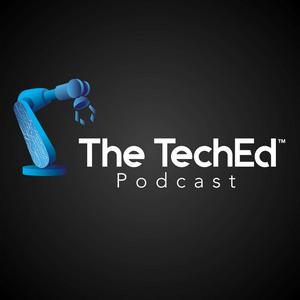The $10 Million Workforce Experiment That Could Redefine Apprenticeships in America - Lindsay Blumer, CEO of WRTP | BIG STEP
Workforce systems are often fragmented—built around short-term funding, disconnected programs, and a lack of coordination between industry, education, and community.But a different model is taking shape - one that’s not only working in practice, but has the potential to scale across states and regions. In this episode of The TechEd Podcast, host Matt Kirchner sits down with Lindsay Blumer, President & CEO of WRTP | BIG STEP, to explore how her organization is building a future-ready, industry-led, and worker-centered workforce ecosystem.Backed by a $10 million grant, Lindsay and her team are launching the Apprenticeship Pathway Coalition Initiative (APCI)—a five-year effort to expand apprenticeship pathways into emerging industries, strengthen regional partnerships, and create a scalable blueprint for workforce development in both urban and rural communities. From infrastructure and manufacturing to healthcare and IT, this episode explores how WRTP is aligning training, policy, and industry needs to meet the challenges of today’s labor market—and what other states can learn from it.Listen to learn:What it takes to design a workforce model that can be replicated across states and sectorsWhy modern apprenticeships are expanding beyond the trades to include fields like healthcare, IT, marketing, and educationHow WRTP balances short-term upskilling needs with long-term career pathways for workers and employersThe role of intermediaries in navigating funding, aligning stakeholders, and simplifying workforce systemsWhat educators, employers, and workforce leaders can do today to become more effective partners in building talent pipelines3 Big Takeaways from this Episode:1. A scalable workforce model starts with alignment, not duplication. WRTP | BIG STEP acts as a “workforce intermediary,” connecting education, labor, employers, and community organizations to create coordinated talent pipelines across regions. Their funding model blends federal, state, philanthropic, and employer-based sources—like the cents-per-hour contribution from union contractors—to sustain long-term collaboration and flexibility.2. Modern apprenticeships go far beyond the trades. Lindsay explains that apprenticeships now exist in fields like healthcare, IT, agriculture, marketing, and education, expanding far beyond traditional construction roles. She points out that 55% of new jobs in the next decade won’t require a college degree—making earn-and-learn models more relevant than ever.3. If you want to replicate success, start by listening. WRTP’s statewide initiative begins with asset mapping and community conversations, not pre-built solutions—because what works in one region may not work in another. Lindsay emphasizes that local lived experience must inform system design, and that conveners should be flexible enough to lead, support, or step back depending on the context.Resources in this Episode:Visit WRTP | BIG STEP's website: wrtp.orgOther resources:Read about the $10 million grant programConnect with We want to hear from you! Send us a text.Instagram - Facebook - YouTube - TikTok - Twitter - LinkedIn


